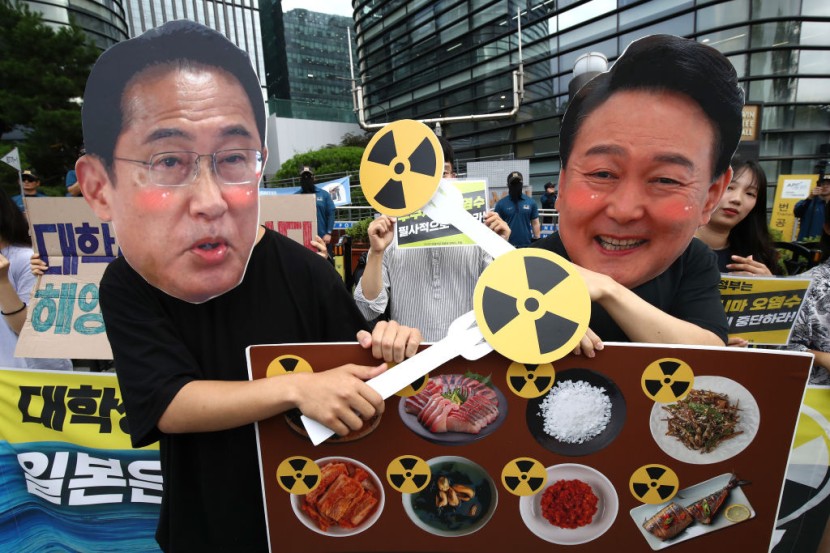
As China bans all Japanese seafood due to the release of one million tonnes of radioactive water into the Pacific Ocean from the ruined Fukushima Daiichi nuclear facility.
Beijing has been accused of hypocrisy and of using the incident to stir up anti-Japanese sentiment, according to The Guardian.
China's Seafood Ban Amid Fukushima Wastewater Release
Scientists have pointed out that China's nuclear power plants release wastewater with higher levels of tritium than those detected in Fukushima's discharge, but that these levels do not pose a health risk to humans.
The company that manages the plant, Tokyo Electric Power (Tepco), began pumping water containing radioactive tritium into the sea on Thursday, initiating a 30-year-long wastewater discharge procedure. The United Nations' atomic overseer, the International Atomic Energy Agency (IAEA), and the Japanese government have approved the plan.
Tepco announced on Friday that rapid analyses of samples taken from the first batch of released wastewater revealed radioactivity levels that are well within safe limits.
Fumio Kishida, the prime minister of Japan, stated that his government had used diplomatic channels to request that China lift its prohibition on Japanese seafood.
According to the Kyodo news agency, Kishida told reporters, "We ardently encourage scientifically-based discussion among experts."
China's Fuqing power facility in Fujian province discharges approximately three times more tritium into the Pacific than Fukushima is expected to release.
Beijing's distinction appears to be based on the fact that Japan's emission originated from a nuclear calamity.
"There is a fundamental difference between the nuclear-contaminated water that came into direct contact with the melted reactor cores during the Fukushima nuclear disaster and the water released by nuclear power plants during normal operation," said the spokesperson for China's foreign ministry, Wang Wenbin, on Wednesday.
They are distinct in nature, derived from distinct origins, and require varying degrees of sophistication to manage.
When asked about its prohibition on Japanese seafood, Hong Kong authorities claimed the situation was "completely different" and that other radioactive substances could be present.
The Kori nuclear power facility in Busan, South Korea, emits a quantity comparable to that of Fuqing.
South Korea has also criticized the Fukushima decision, but its government has recently stated that it accepts the IAEA's report on the plan's safety, Denver Post reported.
Concerns Over Fukushima Water Discharge Impact
Numerous scientists concur with the IAEA that the discharge will have "negligible" radiological consequences for humans and the environment.
Dr. David Krofcheck, a senior lecturer at the University of Auckland, stated, "The release of filtered cooling water containing tritium atoms from the Fukushima facility will not cause any physical harm."
Tritium is produced naturally as part of our normal background radiation, and it travels to the world's oceans via rain or rivers. The water release is designed to contain seven times less tritium per liter than the World Health Organization recommends for potable water.
Normally operating nuclear power plants have released significantly more tritium into the north Pacific Ocean since these plants in China, South Korea, and Taiwan were first located on coastal sites.
The biological effects of tritium, carbon-14, strontium-90, and iodine-129, which will be discharged with the water, have been "ignored," according to Greenpeace.
Tepco and the Japanese government have stated that the filtration process will remove strontium-90 and iodine-129 from the contaminated water, while the concentration of carbon-14 in the water is well below the discharge standard.
The Citizens' Nuclear Information Centre in Japan is among the critics who assert that not enough is known about the long-term effects of tritium discharge into the ocean.
"Tepco, the [Japanese] government, and the IAEA have all failed to adequately consider and evaluate the environmental contamination caused by the long-term discharge of radioactive materials and the behavior of radioactive materials in the environment," it said.
Chinese fishmongers are now concerned about vacant shelves because they are unable to restock with Japanese imports, which were previously regarded as of superior quality to seafood from other countries.
As in the aftermath of the 2011 Fukushima catastrophe, there has been a run on salt in some Chinese supermarkets due to unfounded rumors that the iodine in salt can prevent radiation poisoning.
The China National Salt Industry Corporation, the state-owned salt monopoly, issued a statement on Thursday addressing "panic purchasing" and assuring consumers that its salt was not contaminated by Japanese nuclear pollution.
Additionally, the dispute has stirred up nationalist sentiments. In a poll posted to Weibo this week, respondents were asked about their feelings regarding the discharge.
There were three choices: "It violates international conventions and international marine protection laws," "It is irrational behavior that defies common sense," and "It causes severe ecological damage."
Six of the top ten trending topics on Friday morning were related to Japan and Fukushima, with one topic advocating for Mount Fuji to erupt. On Weibo, Chinese users have begun spreading lists of Japanese cosmetics and urging others to boycott them out of radiation concerns.
On Thursday, the Chinese Ministry of Foreign Affairs was asked why it was only prohibiting seafood imports from Japan, given that its stated scientific concerns regarding water contamination should also apply to the seas surrounding Russia and South Korea.
Wang did not respond, instead reiterating accusations that Japan had turned itself into an ecological system saboteur and ocean polluter, as per BBC.
© 2026 HNGN, All rights reserved. Do not reproduce without permission.








